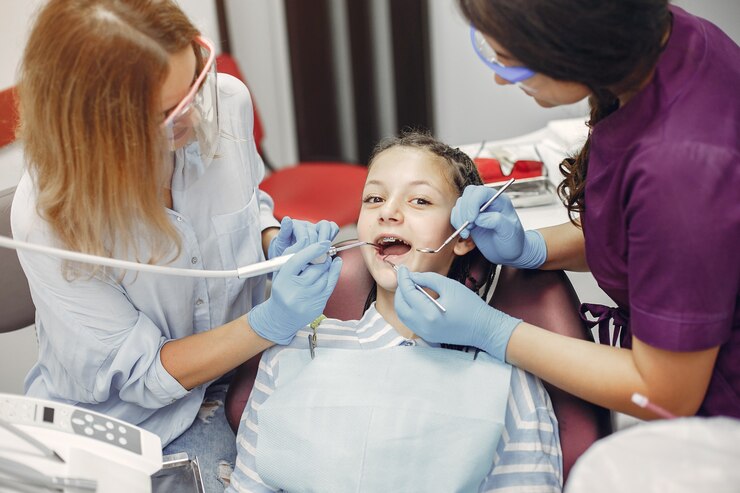Right Now
The Effects of Medications on Children's Dental Health
As parents and caregivers, we all want our children to grow up healthy and strong. One important aspect of their overall health is their dental care, which can be influenced by many factors, including the medications they take. While medications are often necessary for treating various conditions, they can sometimes have unintended effects on your child’s teeth and gums. In this blog, we’ll explore how different types of medications can affect children's dental health and what steps you can take to protect their smiles.
Common Medications and Their Effects on Dental Health
Many medications prescribed to children can impact oral health in different ways. Here are some of the most common types of medications and how they can affect your child's teeth:
1. Antibiotics
Antibiotics are commonly prescribed to children for bacterial infections. While antibiotics themselves don’t typically cause dental problems, some antibiotics, such as tetracycline, can stain developing teeth. Tetracycline can cause a yellowish or grayish discoloration in the teeth, especially in children whose teeth are still developing (generally under the age of 8).
What to Do: If your child needs an antibiotic, make sure to ask your dentist if there are any potential risks for their dental health. If possible, your child’s dentist may recommend an alternative antibiotic.
2. Cough Syrups and Liquid Medications
Many cough syrups, especially those that contain sugar, can contribute to tooth decay. When children take liquid medications, sugar can stick to their teeth, feeding harmful bacteria in the mouth that cause cavities. Even sugar-free syrups can cause dental issues if they contain acidic ingredients.
What to Do: After your child takes a liquid medication, encourage them to drink water and rinse their mouth. If brushing is not immediately possible, a rinse with water can help reduce the sugar and acid residue left behind.
3. Asthma Inhalers
Children with asthma may use inhalers to help manage their condition. However, inhalers, especially those that contain steroids, can lead to a dry mouth, which is a condition where the mouth doesn’t produce enough saliva. Saliva is essential for washing away food particles and bacteria, so a lack of it can increase the risk of cavities and gum disease.
What to Do: Encourage your child to rinse their mouth with water after using an inhaler. Regular brushing and flossing are also crucial, and in some cases, your dentist might recommend a fluoride treatment to help prevent cavities caused by dry mouth.
4. Medication for ADHD (Stimulants)
Stimulant medications used to treat attention-deficit hyperactivity disorder (ADHD), such as Ritalin or Adderall, can lead to dry mouth and an increased risk of cavities. Dry mouth occurs because these medications can reduce saliva production, making it easier for plaque and bacteria to accumulate on teeth.
What to Do: Encourage your child to drink plenty of water throughout the day to help keep their mouth moist. Additionally, your child should brush and floss regularly, and your dentist may suggest fluoride treatments or saliva substitutes to help protect against cavities.
5. Antidepressants and Anti-Anxiety Medications
Medications used to treat depression and anxiety, such as selective serotonin reuptake inhibitors (SSRIs), can also cause dry mouth. This can lead to an increased risk of cavities and gum disease. Some antidepressants can also cause gum overgrowth, a condition where the gums grow larger than usual, potentially covering the teeth and making it harder to maintain oral hygiene.
What to Do: If your child is taking medication for depression or anxiety, it’s important to have regular dental checkups. Your dentist may recommend more frequent cleanings or suggest a fluoride treatment to help protect against cavities. Regular brushing and flossing are crucial to maintaining healthy gums and teeth.
Preventing Dental Issues Caused by Medications
While medications are often necessary to manage health conditions, there are steps you can take to minimize their impact on your child’s dental health:
- Maintain Good Oral Hygiene: Encourage your child to brush their teeth at least twice a day and floss regularly. This is especially important if they take medications that increase the risk of tooth decay or gum disease.
- Stay Hydrated: Drinking water throughout the day can help combat dry mouth, particularly for children using inhalers or medications that cause reduced saliva production. Encourage your child to sip water frequently to keep their mouth moist.
- Rinse After Medications: If your child takes liquid medications or inhalers, make sure they rinse their mouth with water afterward. This helps remove any sugary residue or acids that could lead to tooth decay.
- Regular Dental Checkups: Routine visits to the dentist are crucial to catch potential dental issues early. Your dentist can provide fluoride treatments, professional cleanings, and other preventive measures to protect your child’s teeth from the effects of medication.
- Use a Straw: For children who take sugary medications or drinks, using a straw can help reduce contact between the liquid and their teeth. This minimizes the risk of cavities caused by prolonged exposure to sugar or acid.
Medications play an important role in managing your child’s health, but they can also have side effects that affect their dental health. Dry mouth, cavities, gum disease, and tooth discoloration are common problems that can arise from certain medications. However, with the right care and preventive measures, you can minimize these risks and help ensure your child’s teeth stay healthy. At Smile Gallery Dental Wellness Centre, we offer the Best Kids Dental Care at Bhopal, providing expert guidance and personalized care to keep your child’s smile bright and strong for years to come. Always consult with your pediatric dentist to address any concerns about medications' effects on oral health.
More Posts
Report This Post
Please complete the following requested information to flag this post and report abuse, or offensive content. Your report will be reviewed within 24 hours. We will take appropriate action as described in Findit terms of use.
















